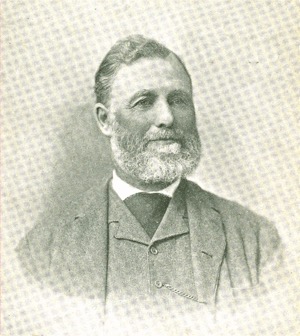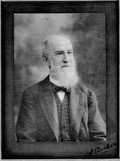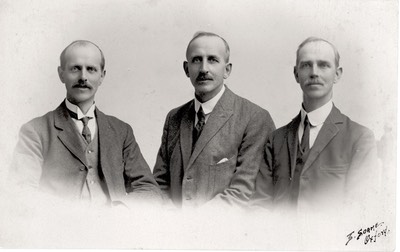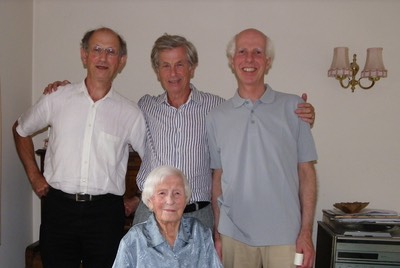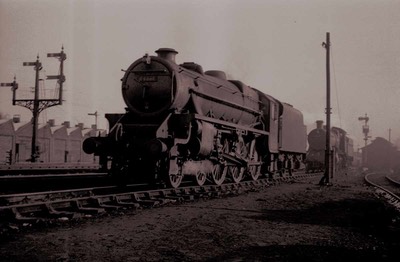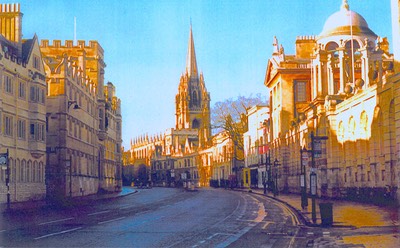Family names:
James Archer, founder of Archer Cowley & Co, married Fanny Porter who was from London;
Alfred George Archer, brother of James Archer married Olive Emma Reed; who was from Devon and then living in Wells, Somerset;
William George Reed Archer, son of Alfred George Archer married Elizabeth Emma Gilder from Oxford;
Frederick George Blake Archer, son of William GR Archer married Gwendolen Mary Penfold; born at Horsham, Sussex and then living in Kingston, Surrey;
Philip Archer, son of Frederick GB Archer married Ruth Garner; born in Radcliffe, Lancashire and then living at Whitefield, Manchester;
"Dramatis Personae”: On this website, I find that I have a habit of referring to people by their initials, e.g. myself as “PBA”, so there is a need for a list identifying these ‘personal acronyms’. So I will progressively see to this. Please click here for my list of family (and other) members identified by initials.
As the page-headings of this web-site above say, the Archers of Oxford were freemen, brewers and haulage contractors in the 19th century. Who do I mean? Well, the two John Archers (father and grandfather of my great-grandfather, Alfred George Archer) were both freemen of Oxford and both were brewers, producing beer for local pubs, at their brewery in St Aldates, Oxford. The two John Archers can be found in the General Family Tree (click here) starting at top-RHS. The haulage contractors were firstly John Archer (above), father of my great-grandfather Alfred, who became a coal-merchant when times got hard in the brewing business in the latter quarters of the 19th century. Secondly, there was James Archer, son of John Archer, turned coal-merchant, who started in 1857 the transport business that became Archer Cowley & Co, as a pony and trap travelling daily to Abingdon.
So, we’ve got Oxford freemen, brewers and haulage contractors so far. What else is there in the ‘family tapestry of lives’? Well, here’s a first stab at a list of colourful contributions to the unique blend of talents and genes that we have inherited:
Oxford freemen, brewers and haulage contractors: the above two John Archers, and several more have been freemen, including William George Reed Archer, my grandfather, his son Frederick George Blake Archer my father, and Michael James Archer my elder brother. Not yet me, for reasons which I will explain elsewhere. And James Archer was notable for his pioneering work on road-haulage in an age of long-distance transport by steam, by providing a hybrid system in whih horses and cartage by road was integrated with high-speed rail transport for loads which were virtually impossible by road. This was the making of James Archer and his firm, that my paternal grandpa and his son, my father, inherited.
"Tinker, tailor, soldier, sailor, rich man, poor man, plough-boy, thief, (**)
And what about a cow boy, policeman, jailer, engine-driver or pirate chief. And what about a postman or a keeper at the zoo, what about the circus man who lets the people through, and the man who takes the pennies for the roundabouts and swings, and the man who plays the organ and the other man who sings? What about a conjuror with rabbits in his pockets?
What about a rocket-man who’s always making rockets?
Oh there’s such a lot of things to do and such a lot to be, that there’s always lots of cherries on my little cherry tree….Tinker, tailor, soldier, sailor, rich man, poor man, plough boy, thief!”
(“Songs from: Now we are six”: Words by AA Milne, music by H Fraser-Simson who also wrote the music for "The Maid of the Mountains”. These songs were played and sung to us from a very early age by our mother, Gwen Archer, at the piano, from the second edition, published 1928 bought from Acotts, Oxford. Delightful musically, while incredibly redolent of the comfortable life of the affluent middle class, which Gwen did not really hail from. But I loved them, and now look back on my thus-musical early life with intense affectionate remembrance as an infinite privilege, that I now realise few children actually have in terms of ‘real live home-made music’’.)
(**) Well, we’ve certainly got most of these: Walter Gilder, my paternal grandmother’s father was a tailor in Jericho, Oxford; and Percy Gilder (Walter’s grandson - pba to check exact relationship) was a WW1 soldier killed on the Somme in 1916, William Hart (not exactly family, but part of the firm of patent agents, UDL, I worked for) had forebears (the Fairburns), one of whose number was a captain of a ship sailing out of Hull in the mid 19th century, and thus a sailor. Not sure about a tinker. As for a rich man, well, it depends on how rich you mean by “rich”, but James Archer left about £65,000 in about 1925, which was about enough to buy 65 very nice detached houses in Oxford in those days. Plenty of poor men in the family. All the agricultural labourers in the family must have been poor - and most branches of this family (and most others) had some of these in the 19th century, including the Wells and the Penfolds; and of course “plough boys” were indeed agricultural labourers; as for a thief, I haven’t found any ‘convictions for petty larceny’ yet, though the family was not immune from other peccadillos such as obstructing the pavement outside his shop (Mr George Blake, (the adoptive father of my grandmother, Lizzy Gilder.Archer) a frequent offender), and the (less trivial) alcohol-related shortcomings in the 1950s (of my ‘Falstaffian charismatic and rugby-loving Uncle Arthur Archer'), not to mention the 1884 self-imposed exile of most (but notably not all of) the Gilder branch of the family from Oxford to Hinckley, Leicestershire in 1884 less than 20 years after the end of penal transportation to Australia, for such offences as petty theft. It appears from Jackson’s Oxford Journal, on the other hand, that my paternal great-grandfather Alfred George Archer was, as Oxford’s representative (whether the only one or not, I’m not sure) of Her Majesty’s Revenue and Customs ie an excise officer, on the law-enforcement side of things in relation to such petty matters as dog-licences in addition to (as my father told me) his more usual tasks of checking the specific gravities (and thus alcohol-content) of brew-liquors at breweries of the kind which had been operated by his father, John Archer, in Archer’s Yard, St Aldates, Oxford in the 1840s and 1850s.
Two very successful 19th-century entrepreneurs: James Archer (brother of my paternal great-grandfather, Alfred George Archer), founder of Archer & Co, the transport business, and Ernest Albert Reed (uncle of my paternal great-grandmother Olive Emma Reed.Archer), founder of Reed Paper, the international paper-making firm;
A musical ‘flapper-generation’ girl (born 1909, so aged 19 at the height of the roaring twenties in 1928) - this is Gwen Penfold, my mother, but who, despite her intense musical love, absolutely did not belong to the affluent party-going set in the 1920s, and probably never have had any opportunity to take the then popular songs to heart by following the admonition: “Let’s misbehave” (**) or “I’m gonna Charleston…”;
(**) “We’re all alone, no chaperone has got our number, the world’s in slumber - let’s misbehave!”
Click here to go to Gwen’s cv. Click here to go to Gwen’s Musical Life Story.
Someone who actually attended the concerts given by that giant of classical music, Rachmaninov, when he toured in the 1920s - this, again, is our mother Gwen Penfold, whose love of music took her to many famous concert venues, paying for these out of meagre earnings as a young piano teacher and from keeping hens, as recounted in her ‘tales of her musical life’ which I have transcribed and will make available;
A ‘Gentlemen’s Smoking-Party Whistler’ (if you’ve ever heard of such an appellation): this is my maternal grandfather, Frank Penfold, who is mentioned as such in his daughter Gwen’s account of her musical life, and who emerges from his daughter’s recollections a slightly ‘racy’ character who liked a little drop to drink once in a while, and an occasional flutter on the horses, not to mention his musical talent that was recognised at gentlemen’s smoking parties, where he was apparently called on to whistle. This may indeed be the origin of Gwen’s formidable musical talent since there is no sign of anything of the sort elsewhere in the family, apart from her cousin Gwenda Morgan’s talent for wood-engraving;
A wood-engraver whose work is widely recognised and is available for collection online: this is my mother, Gwen Penfold.Archer’s cousin, Gwenda Morgan, daughter of Mary Wells.Morgan and David Morgan, who lived all her life in Petworth, Sussex. One of Gwenda’s most accomplished works is the set of engravings accompanying an edition of Gray’s Elegy in a Country Churchyard, published by Golden Cockerell Press, and which are very comparable in standard to those of Agnes Miller Parker’s accompanying the well-known 1940s edition of AE Housman’s A Shropshire Lad;
An aviation pioneer - Ernest Albert Archer; well, I thought of him, until very recently, as a pioneer who had built his own aircraft in about 1910. That is what ‘the record’ (eg an "Oxford Mail” article) appeared to say. But input from a Dutch visitor to this website, who speaks with authority about early Dutch aviation, has corrected my perception. Great Uncle Ernest was more of an early aviation activist, whose enthusiasm led to his appointment as ‘aviator’ for the First Dutch Flying Association, and led also to him training as an aviator at the then newly-set-up Bleriot flying school in France, and several flights as pilot of the aircraft of the FDA at Twello, Holland, and then a crash which though not causing him any lasting injury, did apparently lead to his abandonment of flying for the automotive industry. Click here to go to a page about Ernest Archer.
A Lancashire Cotton Mill Overlooker - William Pickstone was an overlooker (more details in due course) and his daughter Betsy Pickstone married Harry Garner who had a newspaper shop in Radcliffe, Lancashire. His grandaughter is Ruth Garner.Archer, my wife. Click here for the family tree (Descendants of William Pickstone).
A Great Western Railway Engineer: this is George Jackson Churchward, from Stoke Gabriel, Devon, whose Uncle Matthew (his father’s brother) was married to Eliza Reed, the aunt (father’s sister) of Olive Emma Reed, my Grandfather William George Reed Archer’s mother. So Olive Emma Reed was ‘cousin by marriage’ of G.J.Churchward. Which, although not close, and not a blood relationship, is, for me, close enough to the great man to be a wonderful thing to be aware of. “The great GJ Churchward”. A name to conjur with! Chief Engineer at Swindon Works from 1902 to 1920. And a design influence on much of the subsequent steam railway engine development in the 20th century. If only I’d known when I was a trainspotter! But no one in the family knew, apparently.
A Chrysanthemum-growing family firm (Wells of Merstham, Surrey), of which the founder (William Wells), had great-grandchildren (Phil Archer and Jonnet Kirkby), who completely independently made their way to Lancashire, and married sister and brother (Ruth and Andrew Garner) great-grandchildren of the above ‘Lancashire Cotton Mill Overlooker’ (William Pickstone). Click here for a page including a family tree showing the family links;
A Pianist whose home-playing and practising repertoire went to Chopin’s Ballade No.1 in G minor, most of the Chopin Etudes, and much more, so that these classical masterpieces, beautifully executed, were always the familiar cultural backdrop to life in her home. This is Gwen Enfold.Archer, my mother. An enigma. So radically distinctive in her intellectual and musical and even day-to-day housekeeping life, that even after a lifetime of over 100 years, she still eludes analysis. Click here to go to Gwen’s cv. Click here to go to Gwen’s Musical Life Story.
THIS PAGE IS INCOMPLETE AND WILL BE ADDED-TO ASAP (17.11.2014)
